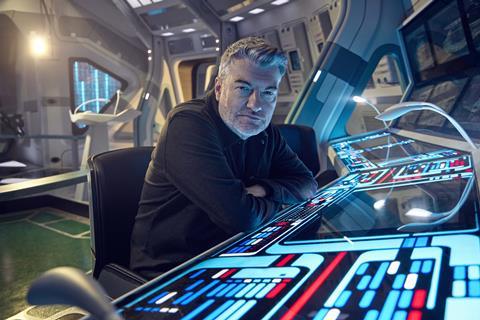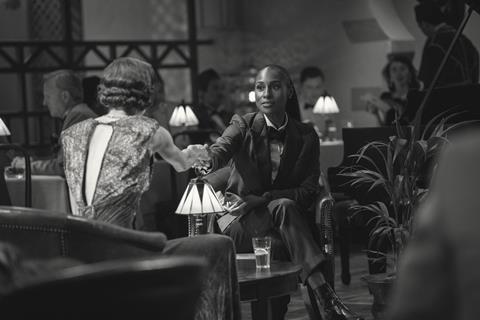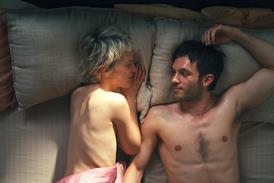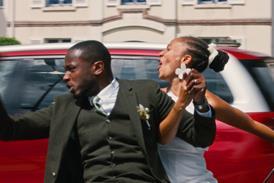Multi-Primetime Emmy winner Charlie Brooker hits warp speed in Black Mirror’s seventh season.

In its six prior seasons, Charlie Brooker’s anthology series Black Mirror, which aired on Channel 4 for two series before moving to Netflix in 2016, has been nominated for 15 Primetime Emmy awards and won six.
Four of those awards came for season four episode ‘USS Callister’, including outstanding television movie and outstanding writing for a limited series, movie or dramatic special for Brooker and episode co-writer William Bridges; the series’ other two wins came for season three episode ‘San Junipero’, also for outstanding television movie and an outstanding writing award for Brooker.
Series seven launched on Netflix on April 10 and, with Primetime Emmys voters about to cast their ballots for this year’s awards (first-round voting runs June 12-23), Brooker speaks to Screen about what inspired this season’s episodes.
“When the show began, there was no sense that it was going to travel. We started with the prime minister fucking a pig [in 2011’s debut episode ‘National Anthem’] – it was almost like we were pulling a prank on the viewer. We didn’t think in any way that this had ‘global show’ written all over it. The challenge with each series is that reality feels like the future is accelerating around us. It feels like we need to move a bit faster than when the show began.
“That said, Black Mirror is less about showing what the near future might look like and more about satirical or emotional, character-based stories which, hopefully, are relatively timeless – along the lines of The Twilight Zone, but using technology rather than the supernatural.
“The other thing about technology is the way it’s more prevalent in our lives than it was when we began, and we need to explain less to the viewer. There is more basic knowledge and experience of tech, and people are interacting with it in different ways all the time. That inspires new stories.
“The other thing is the more dystopian the world gets, the more you see Black Mirror-y headlines and hear people saying, ‘This is like a Black Mirror episode.’ In a way, it’s great free marketing for the show, but it’s not great for us as creatures on the planet.
“Season six was originally going to be called Red Mirror – a companion show, a horror/crime take on Black Mirror that wasn’t tech-focused. Then, annoyingly, I had the idea for ‘Joan Is Awful’ [in which an ordinary woman has her life adapted into a TV series in real-time], which was so Black Mirror-y and so timely that we had to do it there and then. That gave us the issue we had that some [season six] episodes felt like Black Mirror, but we also had ‘Demon 79’ [about an invisible demon] and ‘Mazey Day’ [which features a werewolf], which didn’t. I went back and forth on how to label these and ended up going, ‘Oh, we’ll call them Black Mirror, and we’ll put a little Red Mirror thing on some of the others.’ But I don’t think people noticed that.
“I needed that palette cleanser, though, that bit of time where I wasn’t writing about people in virtual worlds or riffing on social media. But I knew going into this one [season seven] that it was going to be old school Black Mirror. I wanted to lean harder into that stuff, to explore those themes. We’re going to have people put the little nubbin on their temple and their eyes milking out and all that Black Mirror goodness.

“The first one written [for season seven] was ‘Hotel Reverie’ [about the use of AI to remake a 1940s movie], which I’d been toying with for a while. But beyond thinking, ‘This is OG Black Mirror’, for want of a better phrase, I didn’t have an overarching idea or a specific theme. Eventually, it turns out there’s quite a lot of nostalgia and reflection in this season. I was being heavily influenced by The Beatles documentary Get Back and its use of technology to polish up and make the past seem present. You can see that in ‘Hotel Reverie’ and ‘Eulogy’, where technology is being used to step into the past.
“We knew we were going to do a sequel to ‘USS Callister’ [a fourth season episode following a multiplayer online game], although we weren’t quite sure whether we were going to have that sit separately to the main season. That had been developed over quite a long time, originally as a limited series.
“It’s a bit like putting an album together. You’re like, ‘Okay, we’ve done a punk single here. We’ve got a love ballad there. What other flavours are we trying to do?’ ‘Common People’ [in which a woman’s life depends on a subscription service] was the last one written and, if anything, it has the most distilled essence of Black Mirror of all of them.
“I don’t think the episodes this season are very twisty in the traditional sense. I was trying to avoid thinking in that way, because you can get drawn into the trap of trying to give people what they want. Baked into the DNA of the show is that we need to take these handbrake turns every now and then. You can see it in our first season, where we go from ‘The National Anthem’ into ‘15 Million Merits’, which was a heightened, surreal world, then into ‘The Entire History Of You’, which was kind of a kitchen-sink relationship drama. That feels important to do. We’ve done comedy, we’ve done quite frothy episodes, and we continue doing nasty ones.
“When Black Mirror started, all the episodes were downers. They all had bleak, horrible things happen at the end. Then, when we went to Netflix [for the third season], the first one I wrote was ‘San Junipero’, which was deliberately the most positive story I could think of, and it went down really well. Then we did ‘Hang The DJ’ in the fourth season, which was sort of a romcom. I remember being quite nervous about how it would be received, but it went down very well. ‘Eulogy’ is an episode I’m really proud of this season and I was nervous about how people would take it because, in a way, it’s a sentimental episode or a gentle, reflective episode. But people have embraced it.
“One of the reasons I felt I wanted a palette cleanser with the last season was that I was aware there were lots of shows or movies that felt Black Mirror-ish. I can’t complain because I was drawing on all sorts of things. We were slightly ahead of the curve in finding technology unsettling. Black Mirror episodes should feel inevitable. Some of them don’t, obviously, but something like ‘Eulogy’ or ‘Common People’ do. That’s just because I’m riffing on what’s happening around me.
“In season two we did ‘Be Right Back’, where there’s a sort of grief chatbot and that’s now a service. Maybe I should have monetised that. People will forward me Black Mirror-ish things all the time. Somebody was trying out a prototype for something that basically is the technology from ‘Eulogy’, where you scan a photo and have a VR version of it – it’s a short walk from there to an AI filling in the gaps.
“I’m quite positive about technology, which sometimes surprises people, but the show isn’t a warning. Its more about showing powerful tools and sometimes people clumsily misusing them. The tech in our show must look seductively useful, otherwise why would the character use it? And I love the product design aspect. But I’m also worried about the way this tool could be used, in the stories. And I don’t know what the tech bros of the world think about that. They seem so optimistic, like a Roomba bashing into a wall. The problem is, it’s all of us being bashed into the wall.”

























No comments yet